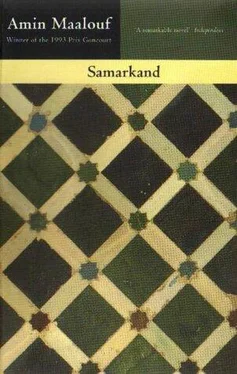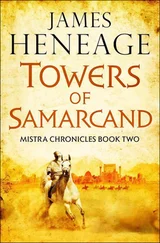Omar had woken up early that morning. He called Vartan who did not reply. Another night spent writing, Khayyam said to himself in a fatherly way. He let him rest a while longer, poured himself a morning drink, just a drop at the bottom of the glass which he swallowed in one gulp followed by a whole glassful which he carried with him as he went for a walk in the garden. He walked around it, diverting himself by blowing on the dew which was still on the flowers, then he went off to gather some juicy white mulberries which he placed on his tongue and squashed against his palate with every sip of wine.
He was enjoying himself so much that a good hour had passed before he decided to go back in. It was time for Vartan to get up. He did not call him again, but went straight into his room to find him stretched out on the ground, his throat black with blood, his mouth and eyes open and set rigid as if in a last suffocated cry.
On his table between the lamp and the writing desk was the dagger with which the crime had been committed. It was planted in a curled up sheet of paper which Omar unrolled to read:
‘Your manuscript has gone on ahead of you to Alamut.’
Omar Khayyam mourned his disciple with the same dignity, the same resignation and the same discreet agony as he had mourned other friends. ‘We were drinking the same wine, but they got drunk two or three rounds before me.’ Anyway, how could he deny that it was the loss of the manuscript which affected him most grievously? He was certainly able to reproduce it; he remembered its every letter but apparently he did not want to, for there is no trace of a rewritten version. It seems that Khayyam learnt a wise lesson from the theft of his manuscript; he would never more try to have control over either his future or that of his poems.
He soon left Merv, not for Alamut — not once did he envisage going there! — but for his home town. ‘It is time,’ he told himself, ‘to put an end to my peregrinations. Nishapur was the first port of call in my life. Is it not within the order of things that it should also be the last?’ It is there that he was going to live, surrounded by relatives, a younger sister, a considerate brother-in-law, nephews, and above all a niece who was to be the recipient of most of the tenderness of his autumn years. He was also surrounded by his books. He did not write any more, but untiringly re-read the works of his masters.
One day, as he was seated in his room as usual with Avicenna’s Book of Healing on his knees, open at the chapter entitled The One and the Multiple’, Omar felt a dull pain start up. He placed his golden tooth-pick, which he had been holding in his hand, between the leaves to mark the page, closed the book and summoned his family in order to dictate to them his last testament. Then he uttered a prayer which finished with the words: ‘My God, You know that I have sought to perceive You as much as I could. Forgive me if my knowledge of You has been my only path towards You!’
He opened his eyes no more. It was 4 December 1131. Omar Khayyam was in his eighty-fourth year, having been born on 18 June 1048 at daybreak. The fact that the date of birth of a person from that era is known with such precision is indeed extraordinary, but Khayyam showed an astrologer’s obsession with the subject. He had most probably questioned his mother to find out his ascendant, Gemini, and to determine the position of the sun, Mercury and Jupiter at the hour of his coming into the world. Thus he drew up his birth chart and took care to pass it on to the chronicler Beihaki.
Another of his contemporaries, the writer Nizami Aruzi, recounted: ‘I met Omar Khayyam twenty years before his death in the city of Balkh. He had come to stay with one of the notables on the Slave-Traders’ Road, and, knowing of his fame, I shadowed him in order to hear every one of his words. That is how I heard him say: ‘My tomb will be in a place where the north wind scatters flowers every spring.’ His words at first seemed absurd to me; however I knew that a man like him would not speak in an unconsidered manner.’
The witness continued: ‘I passed through Nishapur four years after Khayyam’s death. As I venerated him as one should a master of science, I made a pilgrimage to his last home. A guide led me to the cemetery. Upon turning to the left after entering, I saw the tomb adjoining the wall of a garden. Pear and peach trees spread out their branches and had dropped so much blossom on to his sepulchre that it was hidden under a carpet of petals.’
A drop of water fell into the sea .
A speck of dust came floating down to earth .
What signifies your passage through this world?
A tiny gnat appears — and disappears .
Omar Khayyam was wrong. Far from being as transitory as he said, his existence, or at least that of his quatrains, had just begun. But, was it not for them that the poet, who dared not wish it for himself, wished immortality?
Those who had the terrifying privilege at Alamut of being allowed in to see Hassan Sabbah did not fail to notice the silhouette of a book in a hollow niche in the wall, behind a thick wire grate. No one knew what it was, nor dared to question the Supreme Preacher. It was assumed that he had his reasons for not depositing it in the great library where there were great works which contained the most unspeakable truths.
When Hassan died, at almost eighty years old, the lieutenant he had designated to succeed him did not dare install himself in the master’s den and even less did he dare open the mysterious grate. For a long time after the disappearance of the founder, the inhabitants of Alamut were terrified by the mere sight of the walls which had sheltered him; they avoided venturing toward this previously inhabited quarter lest they come across his shade. The order was still subjected to the rules which Hassan had decreed; the community member’s permanent lot was one of the strictest asceticism. There was no deviation, no pleasure, and only more violence against the outside world, more assassinations than ever, most probably to prove that the leader’s death had in no way weakened his adherents’ resolve.
And did these adherents accept this strictness good-naturedly? Less and less. Murmurs started to be heard. Not so much amongst the veterans who had won Alamut while Hassan was alive; they still lived with the memory of the persecutions they had undergone in their countries of origin and feared lest the slightest relaxation make them more vulnerable. However, these men were becoming less numerous every day and the fortress was more and more inhabited by their sons and grandsons. From the cradle, all of them had been accorded the most rigorous indoctrination which forced them to learn and respect Hassan’s onerous directives as if they were divine revelation. But most of them were becoming more resistant. Life was staking its claim on them again.
Some dared one day to ask why they were forced to spend their whole youth in that barracks-type convent from which all joy had been banished. They were so thoroughly repressed that henceforth they guarded against uttering the slightest discordant opinion. That is, in public, for meetings started to be held secretly indoors. The young conspirators were encouraged by all those women who had seen a son, brother or a husband depart on a secret mission from which he had not returned.
One man made himself the spokesman for this stifled and suppressed longing. No one else would allow himself to be put forward: he was the grandson of the man Hassan had designated as his successor and he himself was named to become the fourth Grand Master of the order upon the death of his father.
He had a distinct advantage over his predecessors. Having been born a little after the death of the founder, he had never had to live under his terror. He observed his home with curiosity, and naturally with a certain amount of apprehension, but without that morbid fascination which paralysed all the others.
Читать дальше












